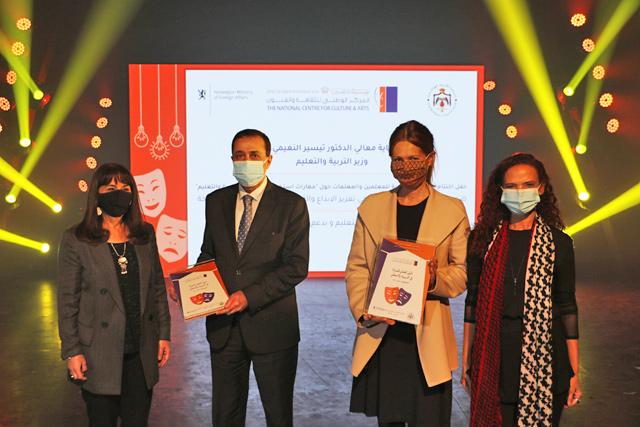You are here
Drama education plays leading role in instilling ‘21st century skills’, conference hears
By Rayya Al Muheisen - Nov 16,2022 - Last updated at Nov 16,2022

Speakers during a conference organised by the National Centre for Culture and Arts in Amman on Tuesday (Petra photo)
AMMAN — A conference organised on Tuesday by the National Centre for Culture and Arts (NCCA) shed light on the importance of drama classes in schools and the effective role they play in moulding students’ skills.
The conference, titled “Drama and Creativity in Education”, is the culmination of the project Creativity in the Classroom implemented by the NCCA, in partnership with the Ministry of Education. The project is supported by Drosos Foundation.
The project consisted of training courses in Drama in Education (DIE) and Theatre Based Techniques (TBT). It has facilitated training for 300 teachers in Amman, Irbid, Zarqa and Karak affiliated with the Education Ministry over the past three years.
Lina Attel, director of NCCA, in her opening remarks, said that the conference is the fruit of the creativity project’s success, adding that “it is extremely important to include drama education as a supplement to the educational process through strategies that enhance the students’ critical thinking, problem solving, communication, collaboration and creativity skills”.
Minister of Education and Minister of Higher Education and Scientific Research Azmi Mahafzah said that students need to develop life skills “now more than ever”.
Mahafzah added that enriching school curricula with drama and arts content enhances students’ knowledge and instils positive value in their mentalities.
The minister added that engaging students in educational drama activities at an early age allows for the use of drama as a means to enhance “21st century skills”. Such skills, Mahafzah outlined, include learning, innovation, critical thinking, problem solving, communication, cooperation, and creativity among students.
Suba Umathevan CEO, Drosos Foundation said that drama education challenges students’ perceptions about their world and about themselves.
“It also provides them with a safe environment to develop their communication skills and understand others in new ways using their body, mind, language and emotions,” said Umathevan.
It is estimated that over 300,000 students from the four governorates will benefit from the programme, according to a statement by the NCCA.
“Drama has contributed to improving the school environment and students’ behaviour,” Ma’ayta, a teacher, said during the conference.
He added that it also unleashed kids’ energies, revealing and developing their talents.
Additionally, the programme helped build the capabilities of teachers to move from traditional education to modern, creative and interactive methods with students, Ma’ayta said.
Related Articles
AMMAN — A total of 100 public school teachers have attended the 'Drama in Education' training designed to instill moral and civic values to
AMMAN — Singers Mohammad Assaf and Farah Siraj will be guests of honour at the 35th International Arab Youth Congress, which opens in Amman
For Mohammad Mahjoub, receiving training at the National Centre for Culture and Arts (NCCA) was not only a chance to learn more about ways to utilise theatre to raise awareness on key issues, but also an opportunity to meet new friends.












